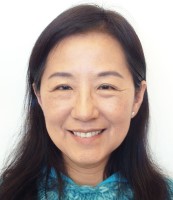Posted: November 18, 2019
By Shelley Wong

In navigating omnipresent calls for attention in our tech-driven lives, Ying-Hui Fu, PhD, professor of neurology at UCSF Weill Institute for Neurosciences, is urging us to rest. "I use the concept of sleep as being similar to preventing fire, which is a different mentality about preventing disease," says Fu.
Getting a good night’s sleep is as fundamental to good health as exercise and healthy eating. Fu sees a correlation between the overall trend of people sleeping less due to modern daily living and higher rates of mood disorders, Alzheimer’s disease, and other diseases. She encourages people to learn about their natural sleeping habits so they understand how much sleep they need to optimally function.
Over the past decade, Fu and colleagues have studied natural short sleepers to uncover gene mutations and learn how they may lead to more efficient sleep and improved health. They published their first gene study (a mutation in a transcriptional repressor (hDEC2-P385R)) in Science in 2009 and two more followed this year in Neuron (a mutation in the β1-adrenergic receptor gene) and in Science Translational Medicine (a missense mutation in a G protein-coupled neuropeptide S receptor 1 (NPSR1)).
Fu and colleagues are exploring how mechanisms and pathways can help explain why natural short sleepers need less sleep, in the hope that the knowledge will lead to improved health resiliency, resistance to disease, and ultimately better health outcomes for everyone.
The 2009 study involved a gene mutation for naturally short sleepers based on a family where two members slept four to six hours a night. These types of sleepers contrast with habitual short sleepers, who train themselves to sleep less. In a surprise to Fu and colleagues, the study led to widespread media coverage in the New York Times, Wall Street Journal, other newspapers, and television shows. Fu received thousands of emails from self-reported natural short sleepers and realized how many people shared the same short sleeping pattern. Fu and colleagues began to collect and rigorously characterize these individuals to expand their study, and they have enrolled over 100 natural shorter sleepers to date.
"My hypothesis is that their sleep is much more efficient," she says. "Whatever our body is doing that takes eight hours every day to clean up toxins and regenerate only takes four to six hours for natural short sleepers. If we can understand the difference between them and us, we will know how the efficiency is regulated, and we can come back and help everybody sleep more efficiently." With better sleep, Fu believes we will see a rise in healthy aging, so that people are not living long lives managing diseases, but are living higher quality lives for longer.
With today’s advanced technology, there is momentum for Fu’s work. "We are now able to use emerging neuroscience technology, including calcium imaging and all kinds of new tools, to look inside the mouse brain," she says. Fu and colleagues make mouse models which recapitulate human phenotypes, and have found that mice which carry the same identified gene mutations as humans also sleep less. The researchers are using brain and neuroscience technology to investigate which parts of the brain are involved in regulating sleep to learn the pathways and mechanisms for this unique group of people.
Of her goals, she says, "My idea is to identify eight to ten genes. If you can imagine that we're trying to build a puzzle and find ten pieces, where each one can serve as a starting point to build on the network, hopefully we will be able to completely know, or at least have a very good idea about, the whole picture in five to ten years. We're trying everything we can think of, using molecular biology, neuroscience, cell biology, et cetera."
Fu finds fulfillment in this work because it reaches all people, not just patients. As a postdoc at Baylor College of Medicine in the early 1990s, Fu cloned one of the genes responsible for a form of muscular dystrophy called myotonic dystrophy, and received a thank-you call from a patient that touched her so deeply, she decided to dedicate herself to research that directly benefits people.
"Everything I do is helping people," says Fu. "I first worked with diseases, but sleep is on a higher magnitude and I'm helping so many people. If you think about why in recent decades we have so many diseases that previously were not common, such as Alzheimer’s disease and mood problems, this coincides with people not paying attention to sleep. What I'm doing now with sleep is so fundamental in helping everybody improve their health, and that is so meaningful. I feel so lucky to be doing this."